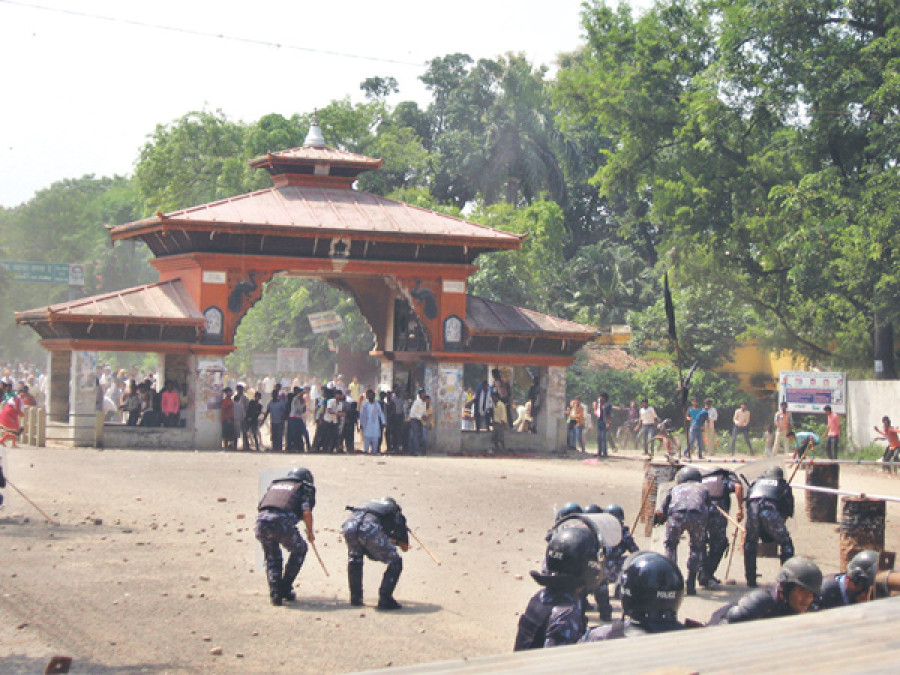Miscellaneous
Two Madhesi fronts forge alliance
The Samyukta Loktantrik Madhesi Morcha (SLMM) and Sanghiya Loktantrik Morcha (SLM), two major fronts leading the protest in Tarai plain, reached an understanding on Saturday to form a broader alliance.
The Samyukta Loktantrik Madhesi Morcha (SLMM) and Sanghiya Loktantrik Morcha (SLM), two major fronts leading the protest in Tarai plain, reached an understanding on Saturday to form a broader alliance.
In a meeting held in the Capital, Madhesi Janadhikar Forum-Loktantrik Chairman Bijaya Kumar Gachhadar, Tarai Madhes Loktantrik Party (TMLP) Chairman Mahantha Thakur and Sadbhawana Party Chairman Rajendra Mahato agreed on a need of working alliance among all agitating forces to mount greater pressure on the major parties.
“The meeting agreed on the need of unity among agitating forces as major parties are unwilling to listen to any demands,” said Ram Janam Chaudhary, MJF-L general secretary.
Saturday’s meeting also agreed to bring in other fronts leading separate protests in the Tarai plains. Besides SLMM and SLM, JP Gupta and Anil Jha have also been staging protests from the very beginning.
The two Madhesi fronts have been forced to forge alliance as three major parties are yet to address their demands that include revision in state delineation.
A total of 42 people, including ten security personnel, have died and hundreds have been injured in the ongoing protest, according to the SLMM.
When some Madhesi leaders regrouped to protest the 16-point agreement that eventually paved way for promulgation of the new constitution, they were hopeful of an early compromise in the disputed issues, including state delineation.
Both fronts have formed a committee to set agendas of the alliance. The joint committee comprises Chaudhary, Keshav Jha of Rastriya Madhes Samajwadi Party (RMSP) and CP Singh of Madhesi Janadhikar Forum-Ganatantrik, Manish Suman of SP, Govind Chaudhary of TMLP and Ram Naresh Raya Yadav Tarai Madhes Sadbhawana Party.
Besides mounting pressure on major parties, Madhesi parties hope to counter challenge the dominance of other underground outfits, including the one led by CK Raut, a separatist.
Many Madhesi leaders fear that radical elements might cash in on the growing radicalism brewing at the ground. Some Madhesi activists say the ongoing protests are no more under the control of the parties.
“The further this protest goes, the more costly it is going to prove. Major parties should not linger this crisis,” said Sanghiya Samajbadi Forum Nepal Chairman Upendra Yadav. He said the alliance will constitutes all agitating groups including Madhesi, Tharu, Janajati, Dalit and Muslim communities.
Despite their efforts for an alliance, the agitating fronts remain divided over numerous issues, including solution to the ongoing crisis. Bijaya Kumar Gachhadar-led SLM has remained open for talks, while rests of the parties have been refusing to do so. There are also key differences between the fronts over the delineation of the state.
The SLMM wants formation of two provinces along the Tarai plains while Gachhadar and his allies are positive about keeping some disputed districts including Jhapa, Chitwan, Kanchanpur in the hilly provinces. They are also open to split some other districts for the sake of consensus.
Madhesi intellectuals said the alliance can prove helpful in both strengthening the protests and to negotiate with major parties. It is also expected to end unhealthy competition among various fronts to project themselves as more revolutionaries. Many believe the competition among major parties was major reason why the protest turned violent.
“It’s a clear indication that chance of agreement remains slim. They intend to launch a final round of protests before sitting for talks,” said Chandra Kishore Jha, a journalist closely following the Madhesi politics.
Jha argued Madhesi parties are also seeking safe landing as the ongoing protest has become “as dangerous as riding a tiger”.
Solution soon, says KP Oli
CPN-UML Chairman KP Sharma Oli has said that current internal and external complexities the country was facing will cease soon.
In an interaction with journalists on Saturday, Chairman Oli said that the government was holding formal and informal talks with agitating parties and hoped of ending the ongoing crisis without further delay.
Tension has run high in the Terai region after Madhes-centric parties continued to protest the new constitution objecting demarcation of states. “The misunderstanding with neighbouring nations will not stay long,” said Oli.
Stating that even the toughest of issues were resolved through peaceful dialogue in the past, Oli said genuine demands of the agitating parties would be addressed by amending the new constitution. “Come for talks and disputes can be resolved,” Oli urged. “Unwanted conflicts will take us nowhere.
We have to adopt politics of consensus.”
When asked about how the parties would take agitating parties into confidence, Oli said the demand could be addressed through a Federal Commission. Citing an example of India, he said number of provinces and borders were changing even after 65 years since the constitution was promulgated. “Constitution is a document of compromise and it can be amended as per necessity,” he said.
Oli said some misunderstandings and illusions has soured relations between Nepal and India. “People from all parts of the country ranging from mountain to Terai and all political parties are friends of India. India should realise this.”
The UML chairman pointed out the need of broader consensus and openness to meet joint target of development and prosperity. The relation between India and Nepal has soured after India objected Nepal’s new constitution endorsed by overwhelming majority. Oli, however, predicted the soured relations will soon end stating that serious talks have already been initiated between the two countries. “Nepal and India share good relations and it will be continued even in the days ahead,” said Oli.




 5.62°C Kathmandu
5.62°C Kathmandu









